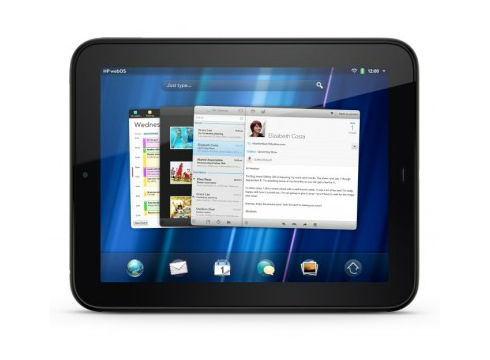Tales In Tech History: The Curious Case Of The HP TouchPad

What tablet lasted barely two months before it was pulled and consigned to the tech dustbin of history?
The HP TouchPad was a tablet computer developed by HP back in 2011 to rival the likes of the mighty Apple iPad.
But it proved to be one of the shortest lived mobile devices ever produced, and was an embarrassing development for a tech titan struggling to innovate and reinvent itself as a maker of ‘cool’ consumer tech.
Promising Start
 HP formally launched the TouchPad on 1 July 2011 in the United States (15 July in the UK and elsewhere), but surprised the industry when it announced just weeks later (on 18 August) that it would be discontinued.
HP formally launched the TouchPad on 1 July 2011 in the United States (15 July in the UK and elsewhere), but surprised the industry when it announced just weeks later (on 18 August) that it would be discontinued.
A firesale then commenced with TouchPad prices cut dramatically, and prompted a surge in people looking to bag themselves a cut price tablet.
TechweekEurope at the time described the 9.7-inch TouchPad as a handsome device with a solid WebOS foundation. But HP found itself going head to head with Apple, which had just launched its iPad 2 in March that year.
The TouchPad came with WebOS 3.0 which placed a heavy emphasis on multitasking and finger-swiping as a navigation gesture.
The device itself boasted a 1.2GHz dual-core processor, but critics argued the user interface felt slow. It weight 1.6 pounds, a bit heavier than the iPad 2 at 1.3 pounds, and it did not have a rear-facing camera.
HP bundled a number of baked-in applications includes email, calendar, chat, photos, maps, Adobe Reader, Quickoffice and a few others and other apps such as Facebook, Angry Birds were also available, widening its appeal to the consumer tablet market.
Cool HP?

So what went wrong? How did it end all end so tragically? Well many point to the actions of then CEO Leo Apotheker.
It should be remembered that Apotheker had initially hoped to turn HP into a ‘cool company’. “I hope one day people will say ‘this is as cool as HP,’ not ‘as cool as Apple,’” Apotheker told the BBC at the time.
HP had in 2010 acquired troubled mobile maker Palm and had the opportunity to create an amazing device with the well regarding WebOS operating system. But HP at that time was a sprawling tech firm with its fingers in a lot of enterprise IT pies including servers, cloud computing, IT services and consumer desktops and laptops.
Its decision to compete in the finicky but lucrative consumer mobile device space was a brave one, and HP had to set the bar very high if it was to take the fight to Apple. It used a 9 February 2011 press event to build the hype about its HP TouchPad device to fever pitch, but then failed to release the product until five months later, but which time much of the initial excitement had long died down.
Poor Leadership?
Unsurprisingly, poor sales followed and Apotheker suddenly decided to call a halt to all mobile HP products. He also put webOS and the PC divisions under review, with an eye to potentially offloading them.
Many have criticised Apotheker’s actions during his tenure at HP. He had joined the firm in the wake of the Mark Hurd sexual harassment case, a move that was questioned by many at the time.
Oracle’s Larry Ellison famously told the Wall Street Journal “I’m speechless” (over the appointment of Apotheker). “HP had several good internal candidates … but instead they pick a guy who was recently fired because he did such a bad job of running SAP.”
Apotheker’s decision to potentially offload HP’s PC division and halt all mobile products, was not the only controversial move he made. At the same time he also acquired British software maker Autonomy for a huge amount of money, and weeks afterwards he was replaced by HP’s board with Meg Whitman.
Whitman initially planned to continue developing webOS as an open-source operating system, but in 2013 she sold the source code and transferred the remaining webOS team to LG.
So ended the remarkably short life of the HP TouchPad.
Quiz: What do you know about HP?